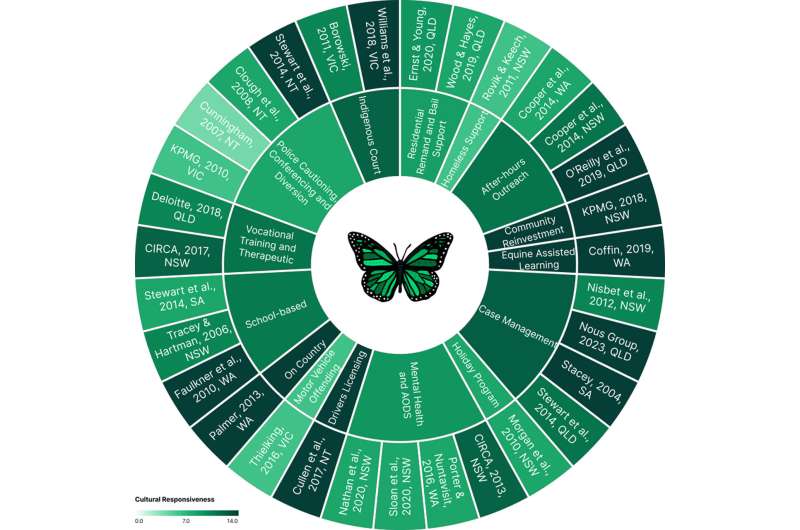This article has been reviewed according to Science X's editorial process and policies. Editors have highlighted the following attributes while ensuring the content's credibility:
fact-checked
trusted source
proofread
Changes needed to keep First Nations children out of incarceration, says study

More culturally responsive diversion programs are needed to prevent the incarceration of Aboriginal and Torres Strait Islander children, according to University of Queensland research.
UQ's School of Nursing, Midwifery and Social Work Ph.D. candidate Lorelle Holland, a Mandandanji woman, led a study that analyzed the effectiveness of dozens of diversion programs across Australia which attempt to keep Indigenous children out of the youth justice system. The paper is published in the First Nations Health and Wellbeing—The Lowitja Journal.
"In 2021 an Australian Institute of Health and Welfare report found Indigenous children aged 10–17 were 20 times more likely to end up incarcerated than non-Indigenous youths—we need to change that," Holland said.
"We found only 10 out of 31 diversion programs addressed areas such as Indigenous connection to land, culture, spirituality, ancestry, family, and community."
The study focused on Aboriginal and Torres Strait Islander children aged 10 to 18 years who were participating in diversion programs ranging from residential remand and bail support, homelessness assistance and help for those appearing before specialist Indigenous courts.
"The best performing programs addressed the complex needs of Indigenous children by supporting their social and emotional well-being through Indigenous-led, place-based, and interdisciplinary collaboration, which resulted in a decline in offending behavior," Holland said.
"Our findings highlight the need to stop the incarceration of Indigenous children with complex needs and instead invest in funding, policy directions and public health to develop and deliver culturally responsive diversion approaches."
Dr. Natasha Reid from UQ's Child Health Research Center said current judicial processes fail to identify or support the complex health and social needs of Aboriginal and Torres Strait Islander children exposed to the youth justice system.
"Prevention strategies should be provided early in a child's life to promote holistic health and well-being, to address the underlying developmental and social needs associated with criminogenic risks," Dr. Reid said.
"By increasing the focus on development and implementation of culturally responsive diversion programs, governments could raise the age of criminal responsibility and reduce punitive punishment, and harmful incarceration of Aboriginal and Torres Strait Islander children."
More information: Lorelle Holland et al, Resisting the incarceration of Aboriginal and Torres Strait Islander children: A scoping review to determine the cultural responsiveness of diversion programs, First Nations Health and Wellbeing—The Lowitja Journal (2024). DOI: 10.1016/j.fnhli.2024.100023
Provided by University of Queensland





















